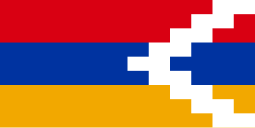Flag of Artsakh
 |
|
| Use | National flag |
|---|---|
| Proportion | 1:2 |
| Adopted | June 2, 1992 |
| Design | A horizontal tricolor of red, blue, and orange with a white sideways zig-zag chevron in the fly |
 |
|
| Use | Historical |
| Proportion | 1:2 |
| Adopted | September 2, 1991 |
| Design | A horizontal tricolour of red, blue, and orange |

Since the Nagorno-Karabakh Autonomous Oblast lacked a flag, the Flag of Azerbaijan SSR was used.
|
|
| Use | Historical |
| Proportion | 1:2 |
| Design | see Flag of the Azerbaijan Soviet Socialist Republic |
On June 2, 1992, the self-proclaimed Republic of Artsakh, a de facto independent republic claimed by Azerbaijan, in the South Caucasus region, adopted a flag derived from the flag of Armenia, with only a white pattern added. A white, five-toothed, stepped pattern was added to the flag, beginning at the two verges of the flag's right side and meeting at a point equal to one-third of the distance from that side. The white pattern symbolizes the current separation of Artsakh from Armenia proper and its aspiration for eventual union with "the Motherland." This symbolizes the Armenian heritage, culture and population of the area, and represents Artsakh as a separated region of Armenia by the triangular shape and the zigzag cutting through the flag. The white pattern on the flag is also similar to the designs used on rugs, a symbol of national identity. The ratio of the flag's breadth to its length is 1:2, same as the Armenian Tricolor.
...
Wikipedia
